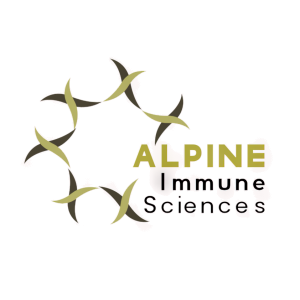Alpine Immune Sciences Announces Update on ALPN-303, a Dual BAFF/APRIL Inhibitor for Systemic Lupus Erythematosus and Other Autoimmune and Inflammatory Diseases, at EULAR 2022
- ALPN-303 uniquely binds BAFF and APRIL with high affinity, differentiating from related inhibitors including wild-type TACI-Fc’s -
- Ongoing phase 1 study demonstrates highly encouraging preliminary pharmacodynamic reductions in circulating immunoglobulins -
ALPN-303 is an Fc fusion of an engineered TACI domain that has significantly improved affinity against the B cell cytokines BAFF and APRIL -- particularly the latter, which wild-type TACI-Fc binds inferiorly. Correspondingly superior pharmacokinetics were observed in animals, as well as pharmacological activity in mouse models of immunization and lupus. Preliminary findings in early single dose cohorts of adult healthy volunteers demonstrate dose-dependent reductions in circulating immunoglobulins (IgA, IgG, IgM).
“The preliminary, emerging clinical findings are particularly encouraging,” said
A copy of the poster presentation is available on the
About ALPN-303
ALPN-303 is a dual B cell cytokine antagonist being developed for multiple autoimmune and/or inflammatory diseases. Engineered by directed evolution, ALPN-303 potently inhibits the pleiotropic B cell cytokines B cell activating factor/B lymphocyte stimulator (BAFF, BLyS) and a proliferation inducing ligand (APRIL), which play key roles in B cell development, differentiation, and survival, and together contribute to the pathogenesis of multiple autoimmune diseases like systemic lupus erythematosus (SLE) and many other autoantibody-related inflammatory diseases. By simultaneously blocking these two cytokines, ALPN-303 has the potential to improve outcomes in patients suffering from severe autoimmune and/or inflammatory diseases. Initiation of a phase 2 study in systemic lupus erythematosus (SLE) and at least one basket study in renal, hematologic, and/or dermatologic indications are planned by the end of 2022.
About the Phase 1 Study
The Phase 1, randomized, placebo-controlled study in healthy adult volunteers is designed to evaluate the safety, tolerability, pharmacokinetics, and pharmacodynamics of intravenously and subcutaneously administered ALPN-303, a dual BAFF/APRIL antagonist. More information on this study can be found at clinicaltrials.gov (study identifier ID NCT05034484)
About
Forward-Looking Statements
This release contains forward-looking statements within the meaning of Section 27A of the Securities Act of 1933, Section 21E of the Securities Exchange Act of 1934 and the Private Securities Litigation Reform Act of 1995. These forward-looking statements are not based on historical fact and include statements regarding our platform technology and potential therapies; the timing of and results from clinical trials and preclinical development activities; clinical and regulatory objectives and the timing thereof; the potential efficacy, safety profile, future development plans, addressable market, regulatory success, and commercial potential of our product candidates; the efficacy of our clinical trial designs; and anticipated enrollment in our clinical trials and the timing thereof. Forward-looking statements generally include statements that are predictive in nature and depend upon or refer to future events or conditions and include words such as “may,” “will,” “should,” “would,” “expect,” “plan,” “intend,” and other similar expressions, among others. These forward-looking statements are based on current assumptions that involve risks, uncertainties, and other factors that may cause actual results, events, or developments to be materially different from those expressed or implied by such forward-looking statements. These risks and uncertainties, many of which are beyond our control, include, but are not limited to: clinical trials may not demonstrate safety and efficacy of any of our product candidates; our ongoing discovery and preclinical efforts may not yield additional product candidates; our discovery-stage and preclinical programs may not advance into the clinic or result in approved products; any of our product candidates may fail in development, may not receive required regulatory approvals, or may be delayed to a point where they are not commercially viable; we may not achieve additional milestones in our proprietary or partnered programs; the impact of competition; adverse conditions in the general domestic and global economic markets; the impact of the COVID-19 pandemic on our business, research and clinical development plans and timelines and results of operations, including the impact on our clinical trial sites, collaborators, and contractors who act for or on our behalf, may be more severe and prolonged than currently anticipated; as well as the other risks identified in our filings with the
View source version on businesswire.com: https://www.businesswire.com/news/home/20220601005412/en/
Investor Relations
Director, Investor Relations and Corporate Development
206-788-4545
ir@alpineimmunesciences.com
Media Relations
Red House
kelli@redhousecomms.com
Source:








